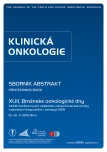Utilization of Next Generation Sequencing in Analysis of Circulating MicroRNAs as Predictive Biomarkers for Patients with Locally Advanced Rectal Carcinoma
Authors:
T. Macháčková 1; T. Grolich 2
; L. Fiala 3; V. Procházka 2
; M. Škrovina 4; Z. Kala 2
; O. Slabý 1
Authors‘ workplace:
CEITEC – Středoevropský technologický institut, Masarykova univerzita, Brno
1; Chirurgická klinika LF MU a FN Brno
2; Oddělení chirurgické onkologie, Masarykův onkologický ústav, Brno
3; Chirurgické oddělení, Komplexní onkologické centrum, Nemocnice Nový Jičín
4
Published in:
Klin Onkol 2019; 32(Supplementum1): 157-159
Category:
Article
Overview
Background: MicroRNAs (miRNA) are short non-coding RNAs involved in post-transcriptional regulation of gene expression. MiRNAs are essential regulators of both physiological processes as of pathogeneses of many diseases, and their dysregulation was observed in many malignancies including rectal cancer. Circulating miRNAs presented in blood plasma could be potential candidates for non-invasive predictive biomarkers of the response of patients with locally advanced rectal cancer to chemoradiotherapy. Presented study aims to evaluate the potential of next-generation sequencing in the analysis of circulating miRNAs.
Material and methods: MiRNA expression profiles were done using samples of RNA isolated from blood plasma collected during TNM restaging and paired samples collected before initiation of neoadjuvant chemoradiotherapy. Sequencing libraries were prepared using kit which implements universal molecular indices that help to sensitively filter biological bias during data analysis. Sequencing data were processed by multidimensional biostatistical approaches.
Conclusion: We identified specific miRNA profile enabling to distinguish the patients accordingly to their response to chemoradiotherapy.
This work was supported by the Czech Ministry of Health grant No. 16-31765A.
The authors declare they have no potential confl icts of interest concerning drugs, products, or services used in the study.
The Editorial Board declares that the manuscript met the ICMJE recommendation for biomedical papers.
Submitted: 22. 2. 2019
Accepted: 27. 2. 2019
Keywords:
rectal cancer – predictive biomarker
Sources
1. Bray F, Ferlay J, Soerjomataram I et al. Global cancer statistics 2018: GLOBOCAN estimates of incidence and mortality worldwide for 36 cancers in 185 countries. CA Cancer J Clin 2018; 68 (6): 394–424. doi: 10.3322/caac.21492.
2. Zavoral M, Suchanek S, Majek O et al. Colorectal cancer screening: 20 years of development and recent progress. World J Gastroenterol 2014; 20 (14): 3825. doi: 10.3748/wjg.v20.i14.3825.
3. Edge SB, Compton CC. The American Joint Committee on Cancer: the 7th Edition of the AJCC cancer staging manual and the future of TNM. Ann Surg Oncol 2010; 17 (6): 1471–1474. doi: 10.1245/s10434-010-0985-4.
4. Jhaveri KS, Hosseini-Nik H. MRI of rectal cancer: an overview and update on recent advances. Am J Roentgenol 2015; 205 (1): W42–W55. doi: 10.2214/AJR.14.14201.
5. Sohel MH. Extracellular/circulating microRNAs: release mechanisms, functions and challenges. Achiev Life Sci 2016; 10 (2): 175–186. doi: 10.1016/j.als.2016.11.007.
6. Ishikawa H, Yamada H, Taromaru N et al. Stability of serum high-density lipoprotein-microRNAs for preanalytical conditions. Ann Clin Biochem 2017; 54 (1): 134–142. doi: 10.1177/0004563216647086.
7. Yu J, Li N, Wang X et al. Circulating serum microRNA-345 correlates with unfavorable pathological response to preoperative chemoradiotherapy in locally advanced rectal cancer. Oncotarget 2016; 7 (39 : 64233–64243. doi: 10.18632/oncotarget.11649.
8. Hiyoshi Y, Akiyoshi T, Inoue R et al. Serum miR-143 levels predict the pathological response to neoadjuvant chemoradiotherapy in patients with locally advanced rectal cancer. Oncotarget 2017; 8 (45): 79201–79211. doi: 10.18632/oncotarget.16760.
9. Azizian A, Kramer F, Jo P et al. Preoperative prediction of lymph node status by circulating mir-18b and mir-20a during chemoradiotherapy in patients with rectal cancer. World J Surg 2015; 39 (9): 2329–2335. doi: 10.1007/s00268-015-3083-8.
Labels
Paediatric clinical oncology Surgery Clinical oncologyArticle was published in
Clinical Oncology

2019 Issue Supplementum1
- Possibilities of Using Metamizole in the Treatment of Acute Primary Headaches
- Metamizole at a Glance and in Practice – Effective Non-Opioid Analgesic for All Ages
- Metamizole vs. Tramadol in Postoperative Analgesia
- Spasmolytic Effect of Metamizole
- Metamizole in perioperative treatment in children under 14 years – results of a questionnaire survey from practice
-
All articles in this issue
- Metastatic Clear Cell Renal Carcinoma Without Evidence of a Primary Renal Tumour Mimicking Advanced Stage of Malignant Lung Tumour
- Utilization of Next Generation Sequencing in Analysis of Circulating MicroRNAs as Predictive Biomarkers for Patients with Locally Advanced Rectal Carcinoma
- Chemoembolization for Treatment of Hepatocellular Carcinoma – National Registry-Based Analysis
- Dynamic Changes in Circulating MicroRNA Levels in Liver Cancer Patients Undergoing Thermal Ablation and Transarterial Chemoembolization
- Molecular Classification of Medullobastomas by Whole Genome Expression Profiling
- Analysis of Blood Plasma MicroRNAs to Enable Identification of Patients with Pancreatic Ductal Adenocarcinoma Who Will Benefit from Surgical Resection
- Clinical Oncology
- Journal archive
- Current issue
- About the journal
Most read in this issue
- Metastatic Clear Cell Renal Carcinoma Without Evidence of a Primary Renal Tumour Mimicking Advanced Stage of Malignant Lung Tumour
- Molecular Classification of Medullobastomas by Whole Genome Expression Profiling
- Dynamic Changes in Circulating MicroRNA Levels in Liver Cancer Patients Undergoing Thermal Ablation and Transarterial Chemoembolization
- Analysis of Blood Plasma MicroRNAs to Enable Identification of Patients with Pancreatic Ductal Adenocarcinoma Who Will Benefit from Surgical Resection
